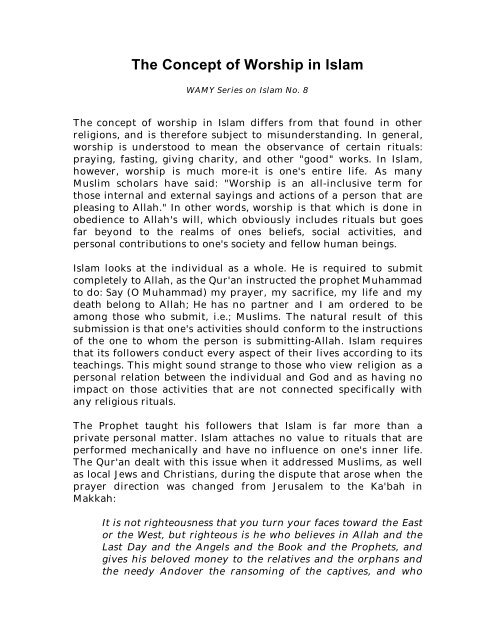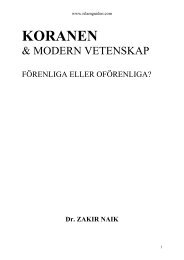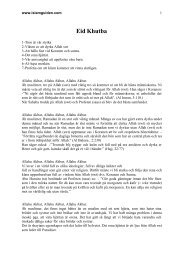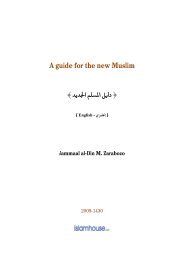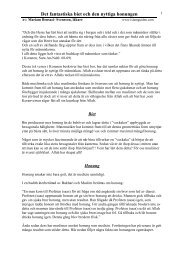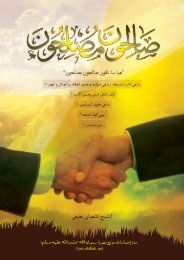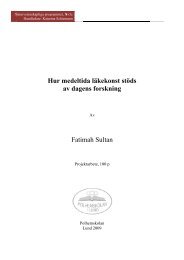Concept of worship in Islam - Sultan
Concept of worship in Islam - Sultan
Concept of worship in Islam - Sultan
- No tags were found...
Create successful ePaper yourself
Turn your PDF publications into a flip-book with our unique Google optimized e-Paper software.
The <strong>Concept</strong> <strong>of</strong> Worship <strong>in</strong> <strong>Islam</strong>WAMY Series on <strong>Islam</strong> No. 8The concept <strong>of</strong> <strong>worship</strong> <strong>in</strong> <strong>Islam</strong> differs from that found <strong>in</strong> otherreligions, and is therefore subject to misunderstand<strong>in</strong>g. In general,<strong>worship</strong> is understood to mean the observance <strong>of</strong> certa<strong>in</strong> rituals:pray<strong>in</strong>g, fast<strong>in</strong>g, giv<strong>in</strong>g charity, and other "good" works. In <strong>Islam</strong>,however, <strong>worship</strong> is much more-it is one's entire life. As manyMuslim scholars have said: "Worship is an all-<strong>in</strong>clusive term forthose <strong>in</strong>ternal and external say<strong>in</strong>gs and actions <strong>of</strong> a person that arepleas<strong>in</strong>g to Allah." In other words, <strong>worship</strong> is that which is done <strong>in</strong>obedience to Allah's will, which obviously <strong>in</strong>cludes rituals but goesfar beyond to the realms <strong>of</strong> ones beliefs, social activities, andpersonal contributions to one's society and fellow human be<strong>in</strong>gs.<strong>Islam</strong> looks at the <strong>in</strong>dividual as a whole. He is required to submitcompletely to Allah, as the Qur'an <strong>in</strong>structed the prophet Muhammadto do: Say (O Muhammad) my prayer, my sacrifice, my life and mydeath belong to Allah; He has no partner and I am ordered to beamong those who submit, i.e.; Muslims. The natural result <strong>of</strong> thissubmission is that one's activities should conform to the <strong>in</strong>structions<strong>of</strong> the one to whom the person is submitt<strong>in</strong>g-Allah. <strong>Islam</strong> requiresthat its followers conduct every aspect <strong>of</strong> their lives accord<strong>in</strong>g to itsteach<strong>in</strong>gs. This might sound strange to those who view religion as apersonal relation between the <strong>in</strong>dividual and God and as hav<strong>in</strong>g noimpact on those activities that are not connected specifically withany religious rituals.The Prophet taught his followers that <strong>Islam</strong> is far more than aprivate personal matter. <strong>Islam</strong> attaches no value to rituals that areperformed mechanically and have no <strong>in</strong>fluence on one's <strong>in</strong>ner life.The Qur'an dealt with this issue when it addressed Muslims, as wellas local Jews and Christians, dur<strong>in</strong>g the dispute that arose when theprayer direction was changed from Jerusalem to the Ka'bah <strong>in</strong>Makkah:It is not righteousness that you turn your faces toward the Eastor the West, but righteous is he who believes <strong>in</strong> Allah and theLast Day and the Angels and the Book and the Prophets, andgives his beloved money to the relatives and the orphans andthe needy Andover the ransom<strong>in</strong>g <strong>of</strong> the captives, and who
observes prayer and pays the poor-due, and those who fulfilltheir promises when they have made one, and the patient <strong>in</strong>poverty and affliction and the steadfast <strong>in</strong> time <strong>of</strong> war; it isthose who have proved truthful and it is those who are theGod-fear<strong>in</strong>g. (2:177)The deeds mentioned <strong>in</strong> the above verse are <strong>in</strong>dications that aperson is righteous. But they are only a part <strong>of</strong> <strong>worship</strong>. Faith,accord<strong>in</strong>g to the Prophet, is the basis <strong>of</strong> <strong>worship</strong> and "is made up <strong>of</strong>sixty and some branches: the highest <strong>of</strong> which is the belief <strong>in</strong> theOneness <strong>of</strong> Allah, i.e., there is no God but Allah and the lowest <strong>in</strong> thescale <strong>of</strong> <strong>worship</strong> is remov<strong>in</strong>g obstacles and dirt from people's way"Honest work is considered a type <strong>of</strong> <strong>worship</strong>. The Prophet said:"Whoever f<strong>in</strong>ds himself at the nightfall tired <strong>of</strong> his work, God willforgive his s<strong>in</strong>s." Seek<strong>in</strong>g knowledge is one <strong>of</strong> the highest types <strong>of</strong><strong>worship</strong>. The Prophet told his Companions that "seek<strong>in</strong>g knowledge isa (religious) duty on every Muslim." He also said: "Seek<strong>in</strong>g knowledgefor one hour is better than pray<strong>in</strong>g for seventy years. " Socialcourtesy and cooperation, when done for the sake <strong>of</strong> Allah, are also apart <strong>of</strong> <strong>worship</strong>: "Receiv<strong>in</strong>g your friend with a smile is a type <strong>of</strong>charity, help<strong>in</strong>g a person to load his animal is a charity, and putt<strong>in</strong>gsome water <strong>in</strong> your neighbor's bucket is a charity"In <strong>Islam</strong>, the perform<strong>in</strong>g one's duties is also considered an act <strong>of</strong><strong>worship</strong>. The Prophet told us that whatever one spends for his familywill be counted as an acts <strong>of</strong> <strong>worship</strong> for which he will be rewarded,provided that he has acquired it through <strong>Islam</strong>ically acceptablemeans. K<strong>in</strong>dness to family members, no matter how small, are alsoviewed as acts <strong>of</strong> <strong>worship</strong>. Even activities that we enjoy very much,such as sexual relations with one's spouse, are considered acts <strong>of</strong><strong>worship</strong> as long as they are performed <strong>in</strong> accordance with therelevant Qur'anic and prophetic guidel<strong>in</strong>es. For example, the Prophetonce told his Companions that they would be rewarded even forengag<strong>in</strong>g <strong>in</strong> sex with their wives. They were astonished and asked:"Are we to be rewarded for do<strong>in</strong>g someth<strong>in</strong>g that we enjoy verymuch?" The Prophet replied: "If you satisfy your desires illegally,will you be punished?" They replied, "Yes. " "So," he said, "bysatisfy<strong>in</strong>g it legally with your wives you will be rewarded."It is clear from the previous discussion that the concept <strong>of</strong> <strong>worship</strong> <strong>in</strong><strong>Islam</strong> is a comprehensive concept that <strong>in</strong>cludes all <strong>of</strong> the positiveactivities engaged <strong>in</strong> by an <strong>in</strong>dividual. This is <strong>in</strong> agreement with the
all-<strong>in</strong>clusive nature <strong>of</strong> <strong>Islam</strong>, which regulates life on the <strong>in</strong>dividual,social, economic, political, spiritual, and all other levels <strong>of</strong> one's life.This m<strong>in</strong>ute attention to one's activities is the reason why the Qur'anand the example and say<strong>in</strong>gs <strong>of</strong> the Prophet deal with all aspects <strong>of</strong>an <strong>in</strong>dividual's and a society's life. As follow<strong>in</strong>g these guidel<strong>in</strong>es is anact <strong>of</strong> obedience to Allah, He considers them as acts <strong>of</strong> <strong>worship</strong>. Thisvery positive attitude encourages <strong>in</strong>dividuals to follow the relevantguidel<strong>in</strong>es and thus to br<strong>in</strong>g about personal and socialtransformation. It also causes an <strong>in</strong>dividual to <strong>in</strong>ternalize theguidel<strong>in</strong>es, for even if no one is watch<strong>in</strong>g him, he knows that Allah iswatch<strong>in</strong>g him.Discuss<strong>in</strong>g non-ritualistic types <strong>of</strong> <strong>worship</strong> first does not mean thatthe ritualistic ones have less importance. In fact, if the latter areperformed correctly and s<strong>in</strong>cerely, the elevate the <strong>in</strong>dividual bothspiritually and morally and actually help him to live a righteous lifeaccord<strong>in</strong>g to the guidance <strong>of</strong> Allah.<strong>Islam</strong> has several ritualistic activities that all Muslims are expectedto perform. The most important one is the prayer (salah), which mustbe performed accord<strong>in</strong>g to a specific style. Its importance derivesfrom the fact that it serves as the dist<strong>in</strong>ctive trait <strong>of</strong> a Muslim andbecause it prevents a Muslim from engag<strong>in</strong>g <strong>in</strong> s<strong>in</strong>ful activities byputt<strong>in</strong>g him <strong>in</strong>to direct contact with Allah five times a day. Thus, theritual prayer is a chance for him to renew his covenant with Allahand to seek His guidance anew. As it says <strong>in</strong> the Qur'an: You alone dowe <strong>worship</strong> and to You alone do we turn for help. Guide us to thestraight path (1:4-.5). Actually, the ritual prayer is the first practicalmanifestation <strong>of</strong> the <strong>Islam</strong>ic faith and is the ma<strong>in</strong> condition for aMuslim's success: Successful <strong>in</strong>deed are the believers who arehumble <strong>in</strong> their prayers. (23:1-2)This has also been emphasized by the Prophet, who said: "Those who<strong>of</strong>fer their prayer with great care and punctuality will f<strong>in</strong>d it a light,a pro<strong>of</strong> <strong>of</strong> their faith and a cause <strong>of</strong> their salvation on the Day <strong>of</strong>Judgment."The second most important pillar <strong>of</strong> <strong>Islam</strong> is zakat, a term thatsignifies giv<strong>in</strong>g to the less fortunate a certa<strong>in</strong> percentage <strong>of</strong> one'searn<strong>in</strong>gs and hold<strong>in</strong>gs. Giv<strong>in</strong>g the poor-due and perform<strong>in</strong>g theprayer are usually mentioned together <strong>in</strong> the Qur'an, for they areboth visible manifestations <strong>of</strong> one's <strong>Islam</strong>ic faith and belief thatAllah is the sole owner <strong>of</strong> everyth<strong>in</strong>g <strong>in</strong> the universe, which he
allows man to enjoy as His trustee for a specific period <strong>of</strong> time:Believe <strong>in</strong> Allah and His Messenger and spend <strong>of</strong> that over which Hemade you trustees (57:7). In this respect, giv<strong>in</strong>g one's poor-due is anact <strong>of</strong> devotion that, like prayer, br<strong>in</strong>gs the believer nearer to hisLord.In addition, this act provides a means to redistribute a society'swealth <strong>in</strong> a way that reduces differences between classes and groups.It makes an important contribution to social stability, for by purg<strong>in</strong>gthe soul <strong>of</strong> the rich person from selfishness and the soul <strong>of</strong> the poorfrom envy and resentment aga<strong>in</strong>st society, it blocks the channelslead<strong>in</strong>g to class hatred and makes it possible for the spr<strong>in</strong>gs <strong>of</strong>brotherhood and solidarity to gush forth. Such stability is not merelybased on the personal feel<strong>in</strong>gs <strong>of</strong> the rich: it stands on a firmlyestablished right that, if denied by the rich, would be exacted byforce, if necessary.The month-long fast <strong>of</strong> Ramadan (siyam) is the third pillar <strong>of</strong> <strong>Islam</strong>.Its ma<strong>in</strong> function is to make the Muslim pure from "with<strong>in</strong>," just asthe external legal code (the Shari'ah) makes his external actions pure.This process <strong>of</strong> purification makes it possible for him to respond towhat is true and good and to shun what is false and evil. As stated <strong>in</strong>the Qur'an: O you who believe, fast<strong>in</strong>g is prescribed for you as it wasprescribed for those before you, that you may ga<strong>in</strong> piety (2:183). Inan authentic tradition, the Prophet reported Allah as say<strong>in</strong>g: "Hesuspends eat<strong>in</strong>g, dr<strong>in</strong>k<strong>in</strong>g, and gratification <strong>of</strong> his sexual passion forMy sake. " Thus his reward is go<strong>in</strong>g to be accord<strong>in</strong>g to God's greatbounty.Fast<strong>in</strong>g, then, awakens an <strong>in</strong>dividual's conscience and gives it scopefor exercise <strong>in</strong> a communal experience that is engaged <strong>in</strong> by theentire Muslim world at the same time. Such a ritual strengthens the<strong>in</strong>dividual's resolve to improve himself and to realize the purpose <strong>of</strong>the whole undertak<strong>in</strong>g. Fast<strong>in</strong>g <strong>of</strong>fers a compulsory rest to the overworkedhuman body for the duration <strong>of</strong> one full month, and alsorem<strong>in</strong>ds Muslims <strong>of</strong> those who are deprived <strong>of</strong> life's necessitiesthroughout the year or throughout one's life. It makes him realizethe suffer<strong>in</strong>g <strong>of</strong> his less fortunate Muslim brothers, a feel<strong>in</strong>g thatpromotes <strong>in</strong> him a sense <strong>of</strong> sympathy and k<strong>in</strong>dness towards Muslimsand other people <strong>in</strong> general.Lastly, we come to the annual pilgrimage to the House <strong>of</strong> Allah (theKa'bah) <strong>in</strong> Makkah. This ritual, known as the hadj, is unique to <strong>Islam</strong>.
Muslims from all comers <strong>of</strong> the world and all attired <strong>in</strong> the samecloth<strong>in</strong>g respond <strong>in</strong> one voice and one language with the follow<strong>in</strong>gphrase upon enter<strong>in</strong>g the sacred prec<strong>in</strong>cts: "labbayk AllahumaLabbayk" (Here I am at your service O Lord!). This is a time <strong>of</strong> strictself-discipl<strong>in</strong>e and control where not only sacred th<strong>in</strong>gs are revered,but even the life <strong>of</strong> plants and birds is made <strong>in</strong>violable: And he thatvenerates the sacred th<strong>in</strong>gs <strong>of</strong> God, it shall be better for him with hisLord (22:30) as well as And he that venerates the way marks <strong>of</strong> God,it surely is from devotion <strong>of</strong> the heart (22:32).Pilgrimage gives an opportunity for all Muslims, regardless <strong>of</strong> theiraffiliations with certa<strong>in</strong> groups, classes, organizations, andgovernments, to meet annually <strong>in</strong> a great congress. The time andvenue <strong>of</strong> this congress has been set by God. All Muslims are <strong>in</strong>vitedto attend, for no <strong>in</strong>dividual or government can deny any Muslim theright to do so. Every Muslim who attends is guaranteed full safetyand freedom as long as he does not violate its sanctity.Thus, <strong>worship</strong> <strong>in</strong> <strong>Islam</strong>, whether ritual or non-ritual, tra<strong>in</strong>s the<strong>in</strong>dividual <strong>in</strong> such a way that he loves his Creator even more, whichcauses him to ga<strong>in</strong> an unyield<strong>in</strong>g will and sp<strong>in</strong>s to wipe out all eviland oppression from his society and to make the word <strong>of</strong> Godtriumphant.


